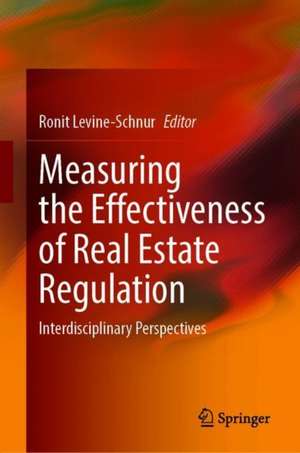Measuring the Effectiveness of Real Estate Regulation: Interdisciplinary Perspectives
Editat de Ronit Levine-Schnuren Limba Engleză Hardback – 20 mar 2020
The book’s eleven chapters are divided into five parts which address different aspects of real estate regulation, combining theoretical analysis with a close observation of diverse case studies, from North America and Europe to China, the Middle East, and developing economies. Part I offers cutting-edge analysis on how to measure, model, and understand the impact of zoning and other modes of real estate regulation, from economic and normativetheoretical viewpoints. Part II complements Part I by providing historical observations and empirical knowledge on the actual contribution of zoning and historical conservation regulation to cities’ shape. Part III considers the outcomes of business and industrial land development policies. Part IV studies urban land development regulation and allows to compare between two relevant case studies—one from Germany, and the other from Poland. Finally, Part V concerns standardization in the real estate market by analyzing the justification and outcomes of such attempts, particularly in the mortgages market.
Providing an interface between theory and practice, the book will appeal to a broad audience, consisting of scholars, policy-makers, practitioners, and students, interested in an interdisciplinary overlook on real estate regulation.
| Toate formatele și edițiile | Preț | Express |
|---|---|---|
| Paperback (1) | 723.69 lei 6-8 săpt. | |
| Springer International Publishing – 20 mar 2021 | 723.69 lei 6-8 săpt. | |
| Hardback (1) | 729.68 lei 6-8 săpt. | |
| Springer International Publishing – 20 mar 2020 | 729.68 lei 6-8 săpt. |
Preț: 729.68 lei
Preț vechi: 889.85 lei
-18% Nou
Puncte Express: 1095
Preț estimativ în valută:
139.63€ • 146.15$ • 116.21£
139.63€ • 146.15$ • 116.21£
Carte tipărită la comandă
Livrare economică 31 martie-14 aprilie
Preluare comenzi: 021 569.72.76
Specificații
ISBN-13: 9783030356217
ISBN-10: 3030356213
Pagini: 218
Ilustrații: XIV, 218 p. 41 illus., 5 illus. in color.
Dimensiuni: 155 x 235 mm
Greutate: 0.5 kg
Ediția:1st ed. 2020
Editura: Springer International Publishing
Colecția Springer
Locul publicării:Cham, Switzerland
ISBN-10: 3030356213
Pagini: 218
Ilustrații: XIV, 218 p. 41 illus., 5 illus. in color.
Dimensiuni: 155 x 235 mm
Greutate: 0.5 kg
Ediția:1st ed. 2020
Editura: Springer International Publishing
Colecția Springer
Locul publicării:Cham, Switzerland
Cuprins
Chapter 1. Measuring the Demand for Land Under Sorting and Matching.- Chapter 2. Capitalization and Exclusionary Zoning.- Chapter 3. The Long-Run Impact of Zoning in U.S. Cities.- Chapter 4. Tracing the Effectiveness of Land-Use Regulation: The Case of Heritage Protection Measures, Flexibility, and Adaptations.- Chapter 5. Scattered Governance: A Typology for Toronto’s Business Improvement Areas.- Chapter 6. China’s land granting reform for industrial land: A quasi experimental evaluation.- Chapter 7. Success Factors of Building Land Strategies – Differences and Commons of the Approaches.- Chapter 8. The effect of formal property rights regime on urban development and planning methods in the context of post-socialist transformation.- Chapter 9. Anchoring and Adjustment in the Mortgage Market: A Regulatory Experiment.- Chapter 10. Dealing With An Anchoring Bias In The Mortgage Market: Regulatory Proposals.- Chapter 11. European Property Law: Competence, Integration and Effectiveness.
Notă biografică
Ronit Levine-Schnur is a Senior Lecturer at the Harry Radzyner Law School, and a Research Associate at the Gazit-Globe Real Estate Institute at the Interdisciplinary Center (IDC) Herzliya. Dr. Levine-Schnur is a lawyer, an urban planner, and a property and land use law expert. She is mostly interested in studying and measuring the effects of regulatory and other legal mechanisms on the socio-spatial distribution of social and economic burdens and benefits and on the effects of social and economic factors on decision-making processes. Her current research project focuses on the effects of expropriation of private property and land use reforms on housing prices and urban thriving.
Textul de pe ultima copertă
This book discusses the fundamental issues regarding the effect of real estate regulation on housing, urban development, and considerations of justice and efficiency. Bringing together the contributions of prominent scholars representing diverse methodologies and academic disciplines, this book offers new perspectives on core topics such as the effectiveness of land use regulation in terms of housing availability, enhanced equality, and sustainable development; and different modes of regulation and their mutual influences.
The book’s eleven chapters are divided into five parts which address different aspects of real estate regulation, combining theoretical analysis with a close observation of diverse case studies, from North America and Europe to China, the Middle East, and developing economies. Part I offers cutting-edge analysis on how to measure, model, and understand the impact of zoning and other modes of real estate regulation, from economic and normative theoretical viewpoints. Part II complements Part I by providing historical observations and empirical knowledge on the actual contribution of zoning and historical conservation regulation to cities’ shape. Part III considers the outcomes of business and industrial land development policies. Part IV studies urban land development regulation and allows to compare between two relevant case studies—one from Germany, and the other from Poland. Finally, Part V concerns standardization in the real estate market by analyzing the justification and outcomes of such attempts, particularly in the mortgages market.
Providing an interface between theory and practice, the book will appeal to a broad audience, consisting of scholars, policy-makers, practitioners, and students, interested in an interdisciplinary overlook on real estate regulation.
Caracteristici
Brings together theoretical and empirical research to draw conclusions about the future effects of real estate regulation Examines the zoning policies of several cities across the world Presents a global perspective via authors from a diverse array of academic backgrounds
